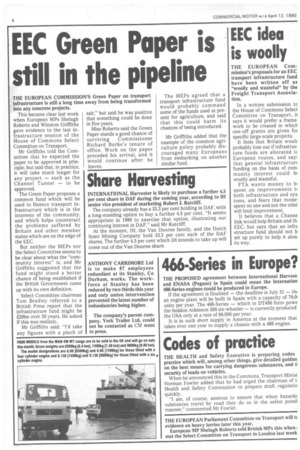EEC Green Paper is still in the pipeline
Page 6

If you've noticed an error in this article please click here to report it so we can fix it.
THE EUROPEAN COMMISSION'S Green Paper on transport infrastructure is still a long time away from being transformed into any concrete projects.
This became clear last week when European MPs Shelagh Roberts and Winston Griffiths gave evidence to the last infrastructure session of the House of Commons Select Committee on Transport.
Mr Griffiths told the Committee that he expected the paper to be approved in principle, but said that, in practice, it will take much longer for any project — such as the Channel Tunnel — to be approved.
The Green Paper proposes a common fund which will be used to finance transport infrastructure which is in the interests of the community, and which helps counteract the problems suffered by Britain and other member states which are on the edge of the EEC.
But neither the MEPs nor the Select Committee seems to be clear about what the "community interest" is, and Mr Griffiths suggested that the fund might stand a better chance of being established if the British Government came up with its own definition.
Select Committee chairman Tom Bradley referred to a British Press report that the infrastructure fund might be £20bn over 20 years. He asked if this was realistic.
Mr Griffiths said: "I'd take any figures with a pinch of salt," but said he was positive that something could be done in five years.
Miss Roberts said the Green Paper stands a good chance of surviving Commissioner Richard Burke's tenure of office. Work on the paper preceded his arrival, and it would continue after he leaves. The MEPs agreed that a transport infrastructure fund would probably command some of the funds used at present for agriculture, and said that this could harm its chances of being introduced.
Mr Griffiths added that the example of the common agriculture policy probably discouraged many Europeans from embarking on another similar fund.
















































































